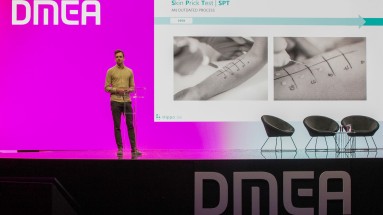Page content
From allergy testing to clinical analysis: four fields of application for AI
These were the questions addressed by the panel "AI in healthcare: Transformation and Innovation" at DMEA 2025 explored these questions in its first part. Four practical examples showed how AI is already benefiting patients and healthcare professionals - and what it will learn in the near future.

Theresa Bloder from nyra health
Feasible and useful: aphasia diagnostics with AI
In "When machines learn to listen", speech therapist Theresa Bloder presented the "myReha" app - the "only evidence-based AI-supported therapy" for people with aphasia to date: the app helps patients to learn to speak again after a stroke or cerebral haemorrhage. "It's a long and emotional journey that requires a lot of support," said Bloder, who heads up the Clinical Research & Health team at Austrian company nyra health. With myReha, users can train their pronunciation independently. The AI provides direct feedback and continuously adapts the therapy content to personal progress.
In a pilot study with a rehabilitation clinic in Germany, nyra is currently using myReha in diagnostics with the Regensburg word fluency test - with promising results already. This shows that "aphasia diagnostics with AI is feasible and makes sense," said Bloder. The algorithm currently needs to be fed with more training data in order to become even more reliable. In the future, however, the tool could be integrated into telemedicine platforms to facilitate follow-up checks, for example. An extension to other diseases such as dementia or Parkinson's is also conceivable.

Rob Cardinaels from Hippo Dx
The Belgian medical technology company Hippo Dx has developed the first automated prick test that can be used to detect allergies. Every third person suffers from an allergy. And 45 percent of these are misdiagnosed, explained Product Manager Rob Cardinaels - for example, because the allergens are quickly applied too strongly or too weakly in the doctor's surgery. The automated S.P.A.T test, on the other hand, injects the allergens at a constant pressure, measures the skin reactions and evaluates them with high precision. This saves time and money and is less painful for the patient.
Use cases in small hospitals
In hospitals in particular, AI could significantly relieve the burden on stressed specialist staff - but smaller hospitals with low budgets often lag behind. Doctoral students Thomas Reibl and Florian Jovy-Klein from RWTH Aachen University have therefore developed a "Systematic process model for the strategic implementation of AI in hospitals": In a self-assessment, hospitals can check how "AI-ready" they are - both technically and organizationally. On this basis, they receive a catalog of measures with prioritization and recommendations as to which investments are currently most worthwhile for the hospital. Even with a small budget, it is worth starting with at least one use case to approach the topic, emphasized Florian Jovy-Klein.
ID also offers support with the introduction of data-driven medicine. Authorized signatory Mark Neumann presented three use cases that ID is currently working on: a portal manager that makes "economic treatment paths" visible, a tool for detecting rare diseases and one for analysis purposes (retrieval), which can be used to extract certain patient cohorts from the system, for example. There has already been a tender for this in Jena in 2024, said Neumann.


